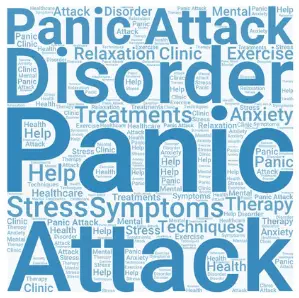An anxiety attack is a sudden, overwhelming feeling of worry and distress. The episode typically precedes a period of growing worry or fear. While the signs and symptoms of anxiety attacks are similar to those of panic attacks, the attack is usually less severe. An anxiety attack can happen without warning, such as when you are about to speak to a friend or mention a political figure. Anxiety attacks can be embarrassing and difficult to deal with, but there are ways to treat them.

Anxiety attack
Anxiety attacks are physiological changes in the body that trigger a high-level stress response. Your body releases high-stress hormones to increase its ability to handle the threat. The effects of these changes last from a few minutes to about 30 minutes, depending on the intensity of the anxiety attack. In addition to the physical changes, anxiety attacks also affect your hormone levels, which are directly proportional to the severity of the attack. Here are some of the most common symptoms associated with anxiety attacks.
The flight-or-fight response is our body’s natural defense against danger, and we often work hard to stimulate it. But to prevent anxiety attacks from becoming a habit, many try to produce them by exposing themselves to stressful situations. Thankfully, anxiety attacks will pass with time. The first step to calming down is to acknowledge the attack. Try re-framing your thinking in a more positive light. Visualize a safe place, relax your body, and focus on positive thoughts.
Anxiety attack causes
A variety of factors can cause anxiety attacks. Stress and worry are often the first symptoms. There are several ways to reduce your risk of an anxiety attack. Walking, jogging, or engaging in some enjoyable activity may help you feel less anxious. It may help to join a positive group that shares similar concerns. Taking a deep breath or performing some form of physical exercises will also help reduce your risk of an anxiety attack.
While anxiety attacks are generally short-lived, some may last hours or even days. A therapist can help you identify the triggers of your anxiety and work with you to develop a plan to address them.
Often, these attacks can interfere with your daily life, causing your social life to suffer. If they are severe, you may need medical help. Anxiety attacks can be crippling, but finding the cause can help reduce their effect. This is a challenging process, but there are some things you can do to find the source of your attacks.
Anxiety attack symptoms
When experiencing severe anxiety, you may be experiencing anxiety attacks. When these episodes occur, you will begin shaking and trembling, and it will seem as if you cannot stop yourself. In some cases, anxiety attacks can be a symptom of a more serious disorder, such as obsessive-compulsive disorder or social phobia. If you notice any of these symptoms, talk to a doctor. They can conduct tests to determine if your anxiety results from a severe medical condition.
Anxiety attack symptoms vary in severity, from only a few to many. Symptoms of an anxiety attack can range from mild to severe, from feeling like you’re about to die to worrying that you’re going to pass out or have a heart attack. A drained feeling and fatigue often come along with these symptoms. In some cases, people who have experienced anxiety attacks fear that they will experience another attack or pass out if they go out in public.
Anxiety panic attacks
Anxiety panic attacks are characterized by imminent danger or impending doom. During an anxiety panic attack, you may feel like you can’t breathe, have chest pain, or feel like you’re going to faint or die. Anxiety panic attacks can be very frightening and may cause you to avoid situations in which you fear having another attack. Panic disorder is a type of anxiety disorder characterized by recurrent and unexpected panic attacks. You may have the panic disorder if you have frequent or severe anxiety or panic attacks. If you have panic disorder, you may also have agoraphobia, a fear of being in situations where escape might be difficult or impossible. Anxiety disorders are treatable, and there is help available. Treatment for panic disorders includes cognitive-behavioral therapy and medication. If you have a panic disorder, you should talk to a mental health professional to get medical treatment and peer support.
Post-Traumatic Stress Disorder (PTSD) panic attack
Various factors can cause PTSD panic attacks. These include exposure to traumatic events, such as combat, sexual assault, or natural disasters. Long-term stressors, such as living in a violent neighborhood or having a very stressful job, can also cause PTSD. Genetic factors can also cause PTSD. Post-Traumatic Stress Disorder panic attack symptoms can vary from a few to many. Symptoms of a PTSD panic attack can range from mild to severe, from feeling like you’re about to die to worrying that you will pass out or have a heart attack. A drained feeling and fatigue often come along with these symptoms. In some cases, people who have experienced PTSD panic attacks fear that they will experience another attack or pass out if they go out in public. If you have PTSD, you may also have avoidance behaviors, such as avoiding people, places, or activities that remind you of the traumatic event.
Generalized anxiety disorder (GAD)
GAD is a type of anxiety disorder characterized by chronic and persistent anxiety. People with GAD may worry about various things, such as their health, job, family, or the future. They may feel like they can’t control their worry, which interferes with Generalized Anxiety Disorder, a chronic condition that can last for years. Generalized anxiety disorder is a treatable condition, and there is help available. It is vital to get treatment for GAD, as it can lead to other problems, such as depression, social isolation, and substance abuse. Treatment for GAD usually includes medication and cognitive-behavioral therapy.
Separation Anxiety Disorder
Separation anxiety disorder is a type of anxiety disorder that is characterized by fear of separation from loved ones. Young children can feel separation anxiety. But it becomes a problem when it persists into adolescence and adulthood. People with separation anxiety may avoid leaving home or attending school, work, or social events. They may also have difficulty sleeping away from home. Separation anxiety disorder is a treatable condition, and there is help available. Treatment for separation anxiety disorder typically includes cognitive-behavioral therapy and medication. If you have a separation anxiety disorder, you should talk to a mental health professional to get treatment. Separation anxiety disorder is a treatable condition, and there is help available.
Other types of panic attacks
Other types of panic attacks can be caused by various factors, including exposure to traumatic events, long-term stressors, genetic factors and social anxiety disorder. Symptoms of a panic attack can range from mild to severe, from feeling like you’re about to die to worrying that you will pass out or have a heart attack. A drained feeling and fatigue often accompany these symptoms. In some cases, people who have experienced panic attacks fear that they will experience another attack or pass out if they go out in public.
What causes anxiety panic attacks ?
Various factors can cause anxiety and panic attacks, including exposure to traumatic events, long-term stressors, or genetic factors. Other mental health conditions and mental illness can also cause anxiety and panic attacks. These include post-traumatic stress disorder (PTSD), generalized anxiety disorder (GAD), or separation anxiety disorder. Treatment for anxiety and panic attacks typically includes cognitive-behavioral therapy and medication. You should talk to a mental health professional if you have anxiety or panic attacks. Symptoms of a panic attack can range from mild to severe. You may feel like you’re about to die, worrying that you will pass out or have a heart attack.
How long do panic attacks last?
Panic attacks are a treatable condition, and there is help available. Panic attacks can last anywhere from a few minutes to several hours. In some cases, people may have recurrent panic attacks. These can indicate an underlying condition, such as anxiety disorder. Treatment for panic attacks typically includes cognitive-behavioral therapy and medication. You should talk to a mental health professional to get treatment if you have panic attacks.
What is the difference between anxiety and panic?
Anxiety is a normal emotion that everyone experiences at some point in their life. Panic is a more intense form of anxiety characterized by fear or terror.
Anxiety is a normal response to specific situations and may be a natural reaction to a bad situation. It is important to note that sometimes anxiety is unfounded, especially if the problem doesn’t warrant it. Anxiety is also a natural reaction to situations that are unlikely to happen. For example, you might be concerned about losing your job or getting robbed. In such cases, you might become so scared that you refuse to leave your home or work. These are all examples of when anxiety is normal.
On the other hand, panic attacks are a more intense form of anxiety characterized by fear or terror. Panic attacks are a treatable condition, and there is help available. Treatment for panic typically includes cognitive-behavioral therapy and medication. You should talk to a mental health professional to get treatment if you have panic attacks.
In conclusion, anxiety and panic are two different things. While anxiety is a normal emotion everyone experiences at some point in life, panic is a more intense form of anxiety characterized by fear or terror. Panic attacks are a treatable condition, and there is help available.
Severe anxiety attack
A severe anxiety attack is a type of anxiety attack that is characterized by intense fear and worry. Severe anxiety attacks can be caused by various factors, including exposure to traumatic events, long-term stressors, or genetic factors. Symptoms of a severe anxiety attack can include feeling like you’re about to die, worry that you’re going to pass out or have a heart attack, and fatigue. Severe anxiety attacks can indicate an underlying condition, such as anxiety disorder.
Anxiety episodes
Anxiety episodes are a symptom of an underlying anxiety disorder. They are generally brief, lasting anywhere from 10 to 30 minutes, and can be triggered by any stressful or traumatic event. The symptoms of an anxiety attack can be debilitating, leaving people feeling like they are about to die or have a heart attack. You may even feel like you’re going crazy and could pass out, making your life a living hell.
Stress attacks
If you’ve ever experienced an anxiety attack, you know how debilitating it can be. They can appear suddenly and feel all-consuming. You may wonder what caused them and what you can do to relieve yourself. In some cases, these attacks are even signs of a more serious medical problem. For example, severe anxiety attacks may result from a heart attack or a depressive disorder. Understanding what causes these attacks can help you prevent them or learn how to deal with them.
Anxiety and stress are related, but often they occur in combination. The causes of anxiety attacks are usually more complex. They can result from several factors, such as a lack of sleep, increased caffeine consumption, or an overwhelming workload. When these factors occur together, you can have a “perfect storm” of circumstances that leads to an anxiety attack. You need to know to deal with anxiety and panic attacks.
In conclusion, anxiety and panic are two different things. While anxiety is a normal emotion everyone experiences at some point in life, panic is a more intense form of anxiety characterized by fear or terror. Panic attacks are a treatable condition, and there is help available. Severe anxiety attacks can be debilitating and may even indicate an underlying condition. If you have panic, you should talk to a mental health professional to get psychotherapy and treatment.

